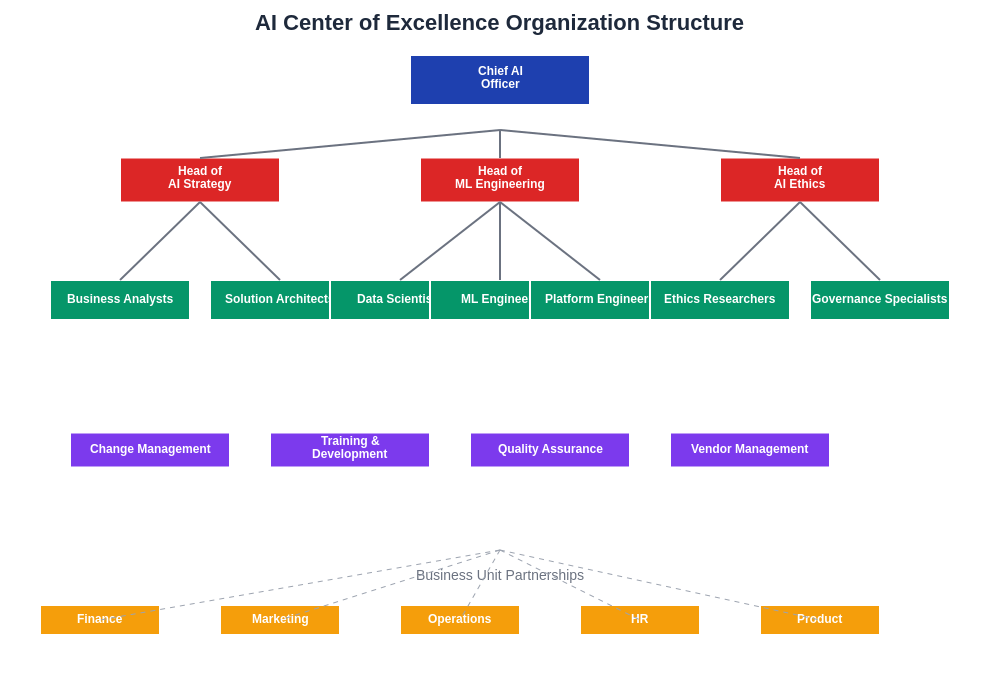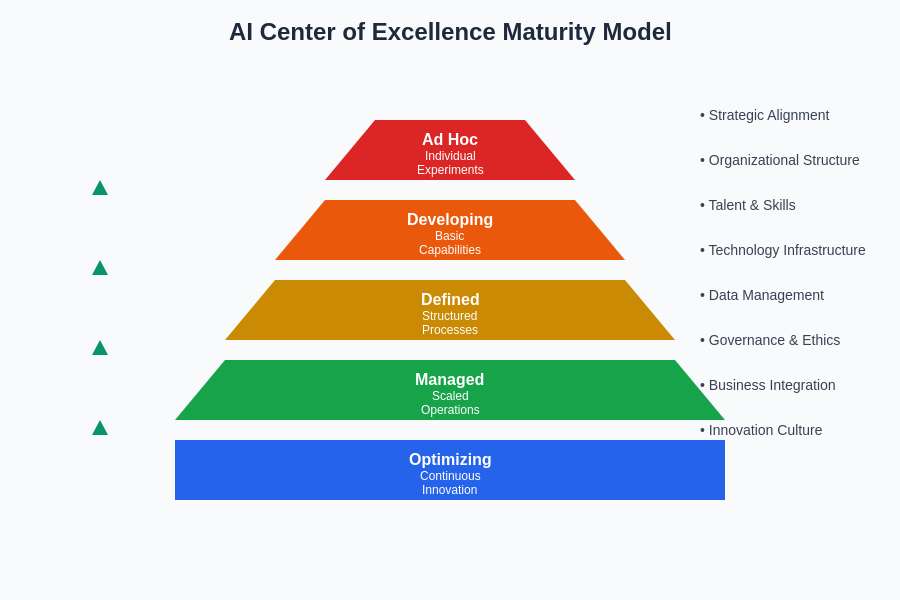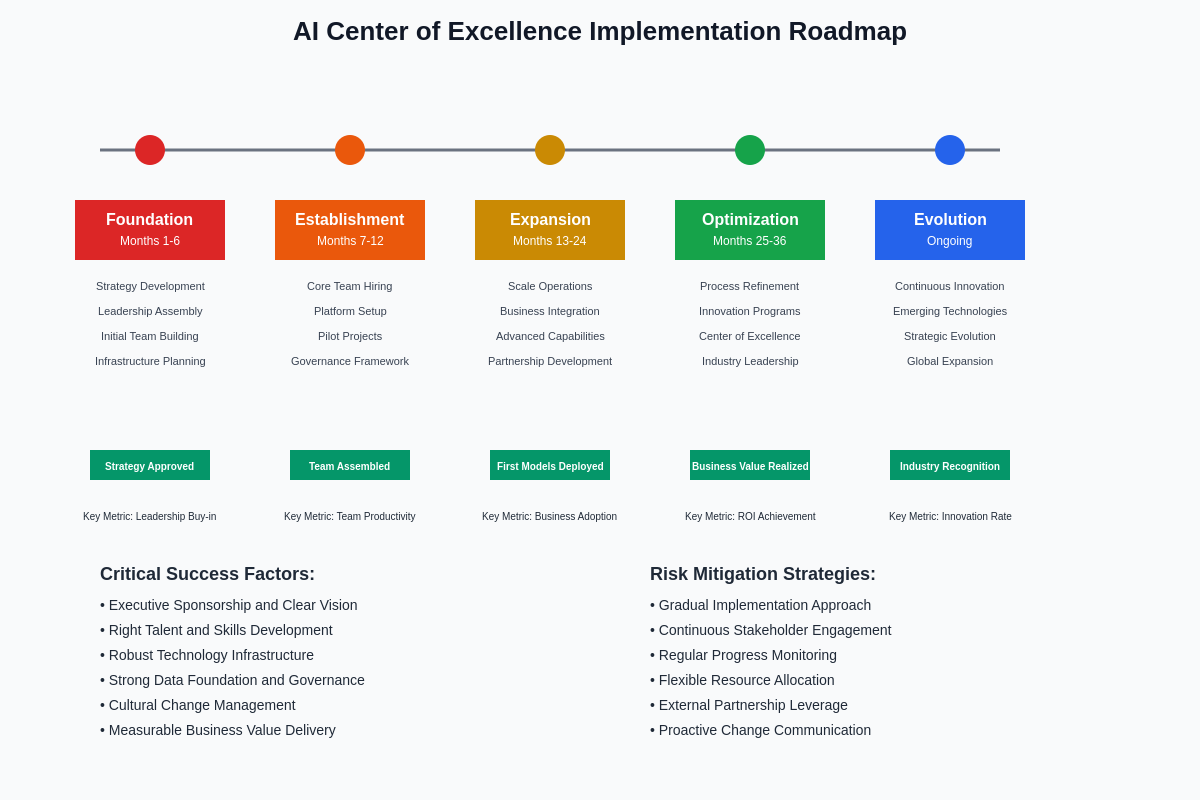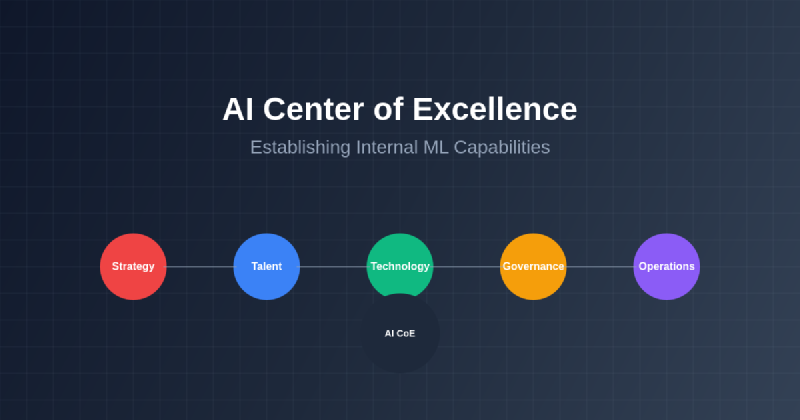The establishment of an AI Center of Excellence represents one of the most strategic investments an organization can make in today’s rapidly evolving digital landscape. As artificial intelligence and machine learning technologies continue to mature and demonstrate unprecedented value across industries, forward-thinking enterprises are recognizing the critical importance of developing centralized expertise, governance frameworks, and operational capabilities that can effectively harness the transformative power of these technologies while ensuring responsible implementation and sustainable growth.
Explore the latest AI implementation strategies to understand how leading organizations are successfully establishing their AI Centers of Excellence and driving measurable business outcomes. The journey toward building internal machine learning capabilities requires careful planning, strategic resource allocation, and a deep understanding of both technological possibilities and organizational readiness factors that determine success or failure in enterprise AI initiatives.
Strategic Foundation and Vision Setting
The creation of an AI Center of Excellence begins with establishing a clear strategic vision that aligns artificial intelligence initiatives with broader organizational objectives and long-term business goals. This foundational phase requires extensive stakeholder engagement, comprehensive market analysis, and honest assessment of current capabilities to determine the optimal approach for building internal machine learning expertise. Organizations must carefully evaluate their existing technology infrastructure, data assets, talent capabilities, and cultural readiness to embrace AI-driven transformation while identifying specific use cases where artificial intelligence can deliver meaningful competitive advantages.
The strategic foundation also encompasses the development of comprehensive governance frameworks that ensure responsible AI implementation while maintaining alignment with regulatory requirements, ethical considerations, and risk management protocols. Successful AI Centers of Excellence establish clear policies for data usage, model development, deployment procedures, and ongoing monitoring that protect both organizational interests and stakeholder rights while enabling innovation and experimentation within appropriate boundaries.
Organizational Structure and Leadership Framework
Building an effective AI Center of Excellence requires careful consideration of organizational structure, reporting relationships, and leadership accountability that ensures both technical excellence and business impact. The most successful implementations typically establish cross-functional teams that combine deep technical expertise in machine learning and data science with strong business acumen, project management capabilities, and change management skills that can effectively bridge the gap between complex technical possibilities and practical business applications.
Leadership structure within an AI Center of Excellence must balance technical leadership with executive sponsorship, ensuring that initiatives receive adequate resources and organizational support while maintaining focus on measurable business outcomes. This often involves creating dual reporting structures where technical teams report to senior data science leadership while also maintaining strong connections to business unit leaders who can provide domain expertise and ensure that AI initiatives address real operational challenges rather than pursuing technology for its own sake.

The organizational structure of a successful AI Center of Excellence typically features a Chief AI Officer at the executive level, supported by specialized heads of strategy, engineering, and ethics, with dedicated teams focusing on specific capabilities while maintaining strong partnerships across business units to ensure practical application and measurable impact.
Enhance your AI strategy with Claude’s advanced capabilities to develop sophisticated reasoning frameworks and implementation roadmaps that accelerate your Center of Excellence development. The integration of advanced AI tools in the planning and execution phases enables more sophisticated analysis of organizational readiness, competitive positioning, and implementation strategies that drive superior outcomes.
Talent Acquisition and Capability Development
The success of any AI Center of Excellence depends fundamentally on assembling the right combination of technical expertise, domain knowledge, and leadership capabilities that can effectively translate artificial intelligence possibilities into tangible business value. This requires comprehensive talent strategies that address both immediate staffing needs and long-term capability development through strategic hiring, partnerships with educational institutions, and internal training programs that build organizational competency across multiple dimensions of artificial intelligence implementation.
Talent acquisition strategies must recognize the highly competitive nature of the AI talent market while developing innovative approaches to attract, develop, and retain top-tier professionals who can contribute to both technical excellence and business impact. This often involves creating compelling value propositions that combine competitive compensation with opportunities for professional development, access to cutting-edge technology platforms, and meaningful work that addresses challenging business problems with significant organizational impact.
The development of internal capabilities extends beyond technical skills to encompass change management, project leadership, and business translation abilities that enable AI professionals to work effectively within existing organizational structures while driving transformation initiatives. This comprehensive approach to talent development ensures that AI Centers of Excellence can maintain momentum and deliver sustained value even as technology landscapes and business requirements continue to evolve.
Technology Infrastructure and Platform Strategy
Establishing robust technology infrastructure represents a critical foundation for AI Center of Excellence success, requiring careful evaluation of computational resources, data management platforms, development tools, and deployment environments that can support both current initiatives and future growth requirements. Modern AI implementations demand sophisticated infrastructure that can handle large-scale data processing, complex model training workflows, and real-time inference capabilities while maintaining high standards for security, reliability, and performance.
The technology platform strategy must balance flexibility with standardization, enabling innovation and experimentation while ensuring that solutions can be effectively scaled, maintained, and integrated with existing enterprise systems. This typically involves hybrid approaches that combine cloud-based services for scalability and advanced capabilities with on-premises resources for sensitive data and specialized requirements that cannot be effectively addressed through public cloud offerings.
Infrastructure considerations also encompass the development of robust MLOps capabilities that enable efficient model lifecycle management, automated testing and validation procedures, and comprehensive monitoring systems that ensure deployed models continue to perform effectively over time. These operational capabilities are essential for maintaining the reliability and business value of AI implementations while reducing the ongoing maintenance burden on technical teams.
Data Strategy and Governance Framework
The effectiveness of any AI Center of Excellence depends critically on the quality, accessibility, and governance of organizational data assets that serve as the foundation for machine learning model development and deployment. Establishing comprehensive data strategies requires careful assessment of current data landscapes, identification of key data sources and quality issues, and development of robust governance frameworks that ensure data can be effectively leveraged for AI initiatives while maintaining compliance with regulatory requirements and organizational policies.
Data governance frameworks must address multiple dimensions of data management including quality assurance, access controls, privacy protection, and lifecycle management that enable AI teams to work efficiently while protecting sensitive information and maintaining regulatory compliance. This often involves implementing sophisticated data cataloging systems, automated quality monitoring tools, and comprehensive access control mechanisms that provide appropriate data access while maintaining security and audit trails.
The data strategy also encompasses the development of data engineering capabilities that can efficiently collect, process, and prepare data for machine learning applications while maintaining high standards for data quality and consistency. These capabilities are essential for ensuring that AI models receive high-quality input data and can deliver reliable, accurate results that support critical business decisions and operational processes.
Model Development and Deployment Processes
Successful AI Centers of Excellence establish standardized processes for model development, validation, and deployment that ensure consistent quality while enabling rapid iteration and experimentation. These processes must balance rigorous testing and validation requirements with the need for agility and responsiveness to changing business requirements and technological opportunities.
Model development processes typically encompass comprehensive project management frameworks that guide initiatives from initial problem definition through successful deployment and ongoing monitoring. This includes establishing clear criteria for project selection, resource allocation, timeline management, and success measurement that ensure AI initiatives deliver meaningful business value while maintaining appropriate risk management and quality standards.
Deployment processes must address the complex technical and operational requirements for moving models from development environments into production systems where they can deliver real business value. This involves sophisticated testing procedures, gradual rollout strategies, and comprehensive monitoring systems that ensure deployed models perform effectively while minimizing risks to operational systems and business processes.
Leverage Perplexity’s research capabilities to conduct comprehensive market analysis and competitive intelligence that informs your AI Center of Excellence strategy and implementation priorities. Access to advanced research tools enables more informed decision-making and strategic positioning that drives superior outcomes and competitive advantages.
Business Integration and Value Realization
The ultimate success of an AI Center of Excellence depends on its ability to effectively integrate artificial intelligence capabilities into existing business processes and operational workflows in ways that deliver measurable value and sustainable competitive advantages. This integration requires deep understanding of business operations, stakeholder needs, and organizational dynamics that influence how AI solutions can be most effectively implemented and adopted.
Business integration strategies must address both technical and cultural challenges that can impede successful AI adoption, including resistance to change, lack of understanding about AI capabilities, and concerns about job displacement or process disruption. Successful Centers of Excellence develop comprehensive change management strategies that address these challenges while building organizational confidence in AI capabilities and commitment to transformation initiatives.
Value realization requires sophisticated measurement frameworks that can accurately assess the business impact of AI initiatives across multiple dimensions including cost reduction, revenue generation, operational efficiency, customer satisfaction, and risk mitigation. These measurement systems enable continuous optimization of AI investments while providing stakeholders with clear evidence of program success and return on investment.
Risk Management and Ethical Considerations
Responsible AI implementation requires comprehensive risk management frameworks that address both technical and ethical considerations while ensuring that artificial intelligence systems operate in ways that align with organizational values and societal expectations. AI Centers of Excellence must establish robust processes for identifying, assessing, and mitigating risks associated with bias, fairness, transparency, and accountability in AI systems.
Ethical considerations encompass multiple dimensions including algorithmic fairness, data privacy, transparency in decision-making processes, and the broader societal implications of AI implementations. Successful Centers of Excellence establish clear ethical guidelines and review processes that ensure AI systems are developed and deployed in ways that respect stakeholder rights and promote positive outcomes for all affected parties.
Risk management processes must also address technical considerations including model reliability, security vulnerabilities, and operational resilience that ensure AI systems continue to perform effectively even under challenging conditions. This requires comprehensive testing procedures, monitoring systems, and incident response capabilities that can quickly identify and address issues that might compromise system performance or organizational operations.
Performance Measurement and Continuous Improvement
Establishing effective performance measurement systems represents a critical capability for AI Centers of Excellence that enables continuous improvement, stakeholder communication, and strategic optimization of artificial intelligence investments. These measurement systems must address both technical performance metrics and business impact indicators that provide comprehensive visibility into program effectiveness and return on investment.
Technical performance measurement encompasses model accuracy, processing efficiency, system reliability, and operational metrics that ensure AI systems continue to meet performance requirements over time. Business impact measurement focuses on quantifiable outcomes including cost savings, revenue generation, process improvement, and customer satisfaction metrics that demonstrate the tangible value of AI initiatives.
Continuous improvement processes leverage performance data to identify optimization opportunities, address emerging challenges, and adapt strategies in response to changing business requirements and technological developments. This iterative approach ensures that AI Centers of Excellence remain effective and relevant while continuously expanding their capabilities and impact across the organization.

The maturity evolution of an AI Center of Excellence progresses through distinct stages from ad hoc experimentation to optimizing continuous innovation, with each level requiring increasingly sophisticated capabilities in strategic alignment, organizational structure, talent development, technology infrastructure, data management, governance, business integration, and innovation culture.
Scaling and Evolution Strategies
Successful AI Centers of Excellence develop comprehensive strategies for scaling their capabilities and impact across the organization while adapting to evolving technology landscapes and changing business requirements. Scaling strategies must address both horizontal expansion into new use cases and business areas as well as vertical deepening of capabilities within existing domains.
Horizontal scaling often involves developing standardized frameworks and reusable components that can be efficiently deployed across different business units and use cases while maintaining consistency and quality standards. This approach enables Centers of Excellence to maximize their impact while minimizing duplication of effort and ensuring efficient resource utilization across multiple initiatives.
Vertical scaling focuses on developing deeper capabilities within specific domains or technology areas that enable more sophisticated applications and greater business impact. This might involve advancing from basic predictive analytics to complex optimization systems or from simple automation to sophisticated decision support capabilities that can handle more complex business challenges.
Evolution strategies must also address the rapidly changing technology landscape and emerging opportunities in areas such as generative AI, edge computing, and autonomous systems that may require new capabilities and approaches. Successful Centers of Excellence maintain awareness of emerging trends while developing adaptive strategies that can effectively incorporate new technologies and approaches as they mature and become viable for enterprise applications.

The implementation roadmap for establishing an AI Center of Excellence spans multiple phases from foundation building through ongoing evolution, with each stage featuring specific activities, milestones, and success metrics that guide organizational transformation while maintaining focus on critical success factors and risk mitigation strategies.
Partnership and Ecosystem Development
Building effective partnerships and ecosystem relationships represents a critical success factor for AI Centers of Excellence that enables access to specialized expertise, advanced technologies, and innovative approaches that might not be available through internal development alone. Partnership strategies must carefully balance the benefits of external collaboration with the need to maintain control over critical capabilities and sensitive information.
Academic partnerships provide access to cutting-edge research, emerging talent, and specialized expertise in advanced AI techniques that can enhance internal capabilities while contributing to the broader advancement of artificial intelligence knowledge and applications. These relationships often involve collaborative research projects, student internship programs, and faculty consulting arrangements that provide mutual benefits while advancing organizational AI capabilities.
Vendor partnerships enable access to specialized platforms, tools, and services that can accelerate AI implementation while reducing internal development costs and complexity. Successful Centers of Excellence develop strategic relationships with technology providers that offer complementary capabilities while maintaining sufficient internal expertise to effectively evaluate, integrate, and manage external solutions.
Industry partnerships and consortium participation provide opportunities to share experiences, learn from peer organizations, and contribute to the development of industry standards and best practices that benefit the broader AI community. These relationships also provide valuable intelligence about emerging trends, competitive developments, and regulatory changes that may impact AI strategy and implementation approaches.
The future of AI Centers of Excellence will be shaped by continued technological advancement, evolving regulatory frameworks, and changing organizational needs that require adaptive strategies and continuous learning. Organizations that successfully establish and maintain effective Centers of Excellence will be well-positioned to capitalize on emerging opportunities while managing the risks and challenges associated with artificial intelligence implementation in enterprise environments.
Disclaimer
This article provides general guidance on establishing AI Centers of Excellence and does not constitute professional consulting advice. Organizations should conduct thorough analysis of their specific circumstances, requirements, and constraints before implementing AI initiatives. The effectiveness of AI Centers of Excellence depends on numerous factors including organizational readiness, resource availability, and market conditions that may vary significantly across different contexts and industries.
